Trump celebrates Kimmel show suspension as Democrats push free speech bill
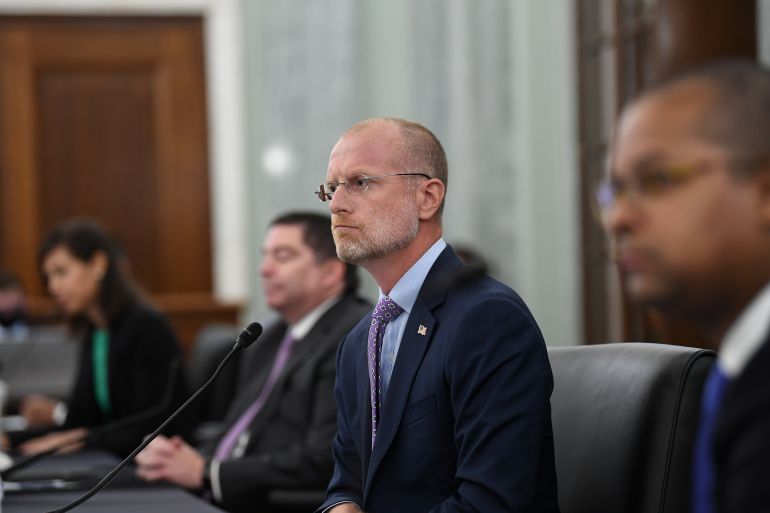
United States President Donald Trump appears to be relishing in the suspension of Jimmy Kimmel after the late-night comedian’s popular talk show was taken off air over comments he made about the killing of conservative activist Charlie Kirk. “He made a total FOOL of himself,” President Trump wrote on his Truth Social platform on Thursday evening, reposting a clip from last year’s Academy Awards in which Kimmel spontaneously took aim at the US leader. Recommended Stories list of 4 itemsend of list Earlier in the day, Trump said Kimmel was fired because he said a “horrible thing about a great gentleman known as Charlie Kirk”. Trump told reporters on his return from visiting the United Kingdom that the Federal Communications Commission (FCC) – which regulates all broadcasts in the US – should consider removing the licences of broadcasters who “hit Trump”. “I would think maybe their licence should be taken away,” Trump said, though federal law prohibits the FCC from revoking a broadcaster’s licence for negative coverage or speech disliked by the government. “It will be up to [FCC Chair] Brendan Carr,” Trump added. The Disney-owned ABC network removed the Jimmy Kimmel Live show from programming indefinitely on Wednesday after an opening monologue by Kimmel in which he said “the MAGA gang” was trying to “score political points” from Kirk’s death. Disney made the move after the FCC’s Carr – a Trump appointee – appeared to imply on a right-wing podcast that Kimmel’s remarks had put Disney’s licence in jeopardy. “This is a very, very serious issue right now for Disney,” Carr said. Advertisement “They have a licence granted by us at the FCC, and that comes with it an obligation to operate in the public interest.” Brendan Carr, then commissioner of the Federal Communications Commission, testifies in a 2020 US Senate oversight hearing [File: Jonathan Newton/Reuters] Kimmel was due to meet with three Disney network executives to discuss the fate of his show, Bloomberg News reported on Thursday. The comedian is the latest in a growing list of media figures, journalists and news organisations to face Trump’s wrath in the form of lawsuits and personal vendettas. In July, CBS said The Late Show with Stephen Colbert would go off air in 2026, days after Colbert criticised CBS’s parent company Paramount for a $16m settlement in a case with Trump. ABC News also agreed to pay $15m over inaccurate on-air comments made by an anchor that Trump had been found “liable for raping” writer E Jean Carroll. Trump had, in fact, been found liable for sexual abuse. More recently, Trump is bringing a multibillion-dollar lawsuit against The New York Times and The Wall Street Journal for their coverage of his relationship with high-flying financier and convicted sex offender Jeffrey Epstein. In another Truth Social post on Wednesday, Trump seemed to suggest further suspensions of late-night comedians, namely two popular NBC hosts. “That leaves Jimmy and Seth, two total losers, on Fake News NBC,” the president said, referring to Jimmy Fallon and Seth Meyers. “Their ratings are also horrible. Do it NBC!!!” Democratic Party lawmakers are now pushing to pass a new bill, called the No Political Enemies Act, which they in part credited to Kimmel’s suspension. The bill aims to deter officials from retaliating against free speech and provides tools for those targeted by the government, according to a legislative summary, though it is unlikely to pass the Republican-controlled Congress. Democratic Senate Minority Leader Chuck Schumer has also called for Carr’s resignation from the FCC in a social media post on Thursday, before railing against the Trump administration in a news conference announcing the bill. “First, let’s be very clear: Political violence has no place in America,” Schumer said. “But let’s also be clear: The Trump administration campaign of threats against civil society and free speech … is an assault on everything this country has stood for since the Constitution was signed,” Schumer said. “There’s an assault on democracy coming out of the White House and their allies, and we see more evidence of it every day,” he said. Brendan Carr should resign immediately, or Trump should fire him. pic.twitter.com/bow6H1ZsFY — Chuck Schumer (@SenSchumer) September 18, 2025 Adblock test (Why?)
Alleged stalking suspect ambushed Pennsylvania police officers, killing 3
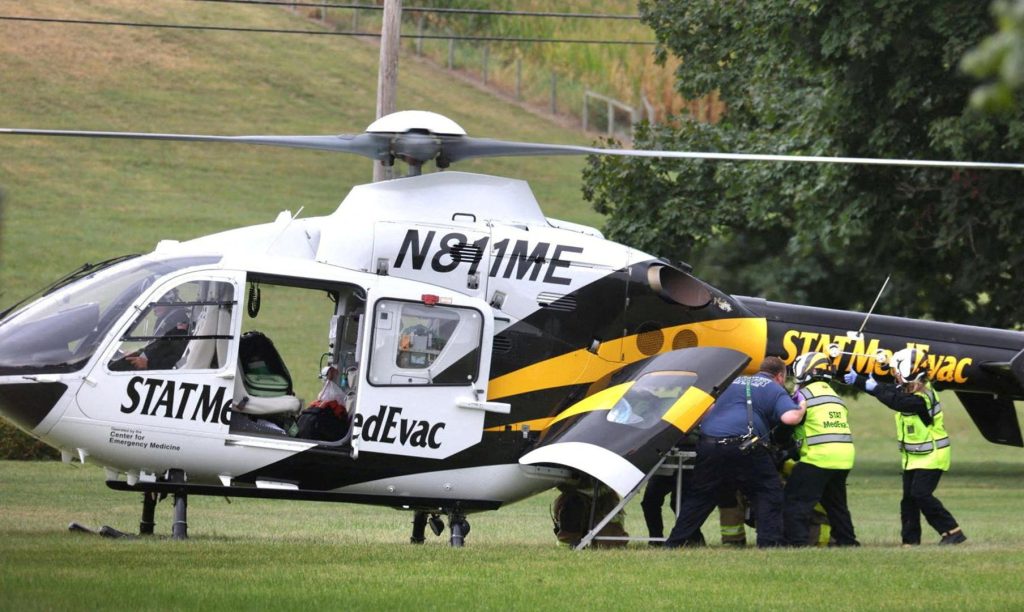
Police detectives were attempting to arrest 24-year-old suspect on suspicion of stalking his ex-partner when he opened fire with AR-15-type rifle. Published On 19 Sep 202519 Sep 2025 Click here to share on social media share2 Share A man who ambushed five Pennsylvania police officers this week, killing three of them, is a suspected stalker who opened fire with an assault-style rifle, according to a local prosecutor. Officers from the North York County Regional Police Department and York County Sheriff’s Office were attempting to serve an arrest warrant for 24-year-old Matthew Ruth when he opened fire, county District Attorney Tim Barker said on Thursday. Recommended Stories list of 3 itemsend of list Ruth was killed in the ensuing gunfight with police, which unfolded at a farmhouse that belonged to his ex-girlfriend and her mother in North Codorus Township, about 185km (115 miles) west of Philadelphia. Barker said five police detectives and a deputy sheriff sought to arrest Ruth on suspicion of stalking his ex-partner, as well as prowling and trespassing. Ruth’s former partner, who has not been named, told police she believed he had set fire to her pick-up truck in August. She then reported to police on Tuesday that he was lurking outside her home in camouflage clothing and peering in through a window with binoculars. After a fruitless search for Ruth on Tuesday night, police visited his home with an arrest warrant on Wednesday afternoon, but he was not there. Officers drove to the farmhouse, from which the ex-girlfriend and mother had fled for their safety, and found the door unlocked. When officers entered the property, Ruth immediately opened fire with his AR-15-type rifle, Barker said. Four police detectives and a sheriff’s deputy were struck by gunfire in the shootout, Barker added. Advertisement Three of the detectives were fatally wounded. Images from the scene after the incident showed officers being airlifted to hospital by a medical helicopter. The ambush-slaying of three police officers in the quiet farm country of southeastern Pennsylvania represented one of the deadliest days for police – not only in the state, but across the United States – in recent times. The attack also came at a time of heightened tension surrounding gun violence in the US, just days after right-wing commentator Charlie Kirk was fatally shot by a lone gunman while speaking in front of a large crowd at Utah Valley University. Adblock test (Why?)
Pentagon official denies report of Charlie Kirk military recruitment drive
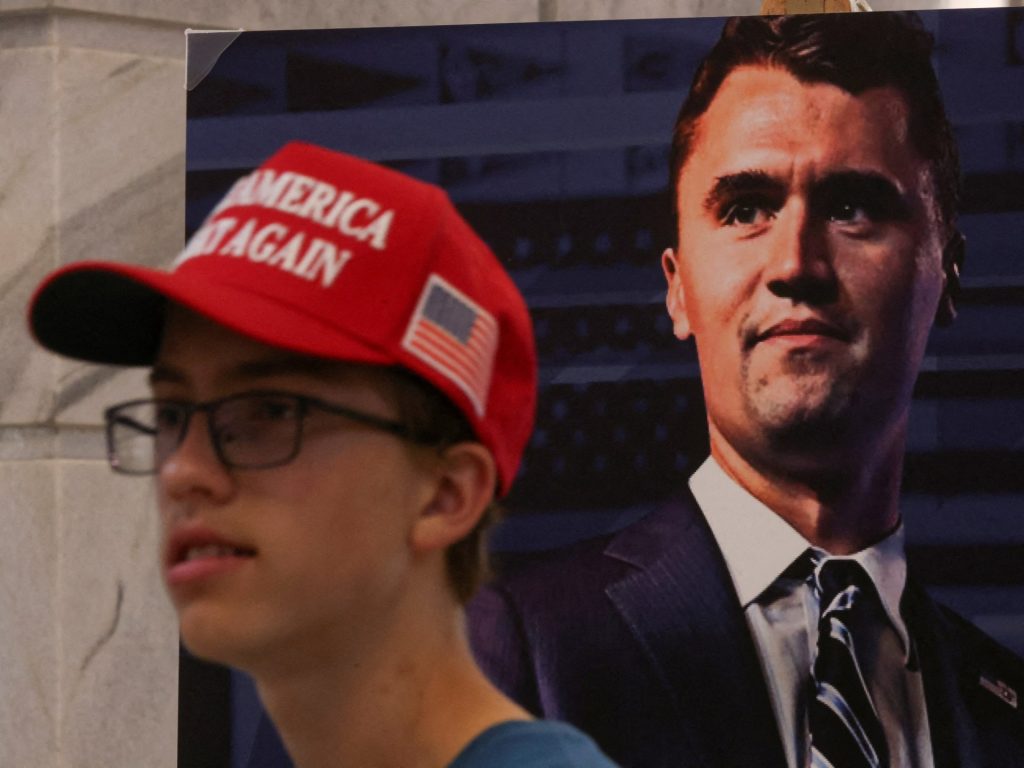
An NBC news report said the military planned to invoke the activist’s memory to recruit a ‘generation of warriors’. Published On 19 Sep 202519 Sep 2025 Click here to share on social media share2 Share The United States Department of Defense has denied reports that it plans to launch a recruiting drive to honour the legacy of conservative activist Charlie Kirk, who was shot and killed at a Utah university event. US network NBC first reported the news on Thursday, citing two officials familiar with the matter, but a Pentagon spokesperson quickly dispelled the report to Fox News. Recommended Stories list of 4 itemsend of list NBC said the Pentagon was debating slogans such as “Charlie has awakened a generation of warriors” as part of its campaign drive, although Kirk himself was not a military veteran. The military also hoped to work with Kirk’s political organisation, Turning Point USA, as part of its recruitment drive, the story said. Turning Point was credited with helping US President Donald Trump win at the polls in 2024 through its work with young voters on high school and university campuses. “This is not happening,” Pentagon Press Secretary Kingsley Wilson told Fox News later on Thursday. Wilson blasted NBC for using anonymous sources to publish “false claims” that were “100 percent wrong”, according to the Fox News report. The two unnamed Pentagon officials in the NBC report said the recruitment plan had been met with resistance from “some Pentagon leaders” who feared they would be seen as capitalising on Kirk’s murder. The Pentagon did not immediately respond to Al Jazeera’s request for comment. Turning Point USA announced on Thursday that Erika Kirk, Kirk’s wife, will take over Turning Point as CEO and chairman of the board. Advertisement “We will not surrender or kneel before evil. We will carry on,” the organisation said in an announcement on social media. “The attempt to destroy Charlie’s work will become our chance to make it more powerful and enduring than ever before.” Kirk’s death has been met with an outpouring of grief from leading Republican lawmakers as well as the White House and the targeting of Kirk’s critics, with people losing their jobs over comments allegedly disparaging the late conservative activist. The US military has also reportedly suspended “several people” for social media posts about Kirk, according to ABC News, although the exact figure is unknown. President Trump, Vice President JD Vance and Defense Secretary Pete Hegseth are all due to speak at Kirk’s memorial service on Sunday, according to a post shared on Turning Point USA’s X account. https://t.co/t0KIbEbhaP pic.twitter.com/ag6kIQBSjh — Turning Point USA (@TPUSA) September 17, 2025 Adblock test (Why?)
What did Jimmy Kimmel say about Charlie Kirk’s killing?
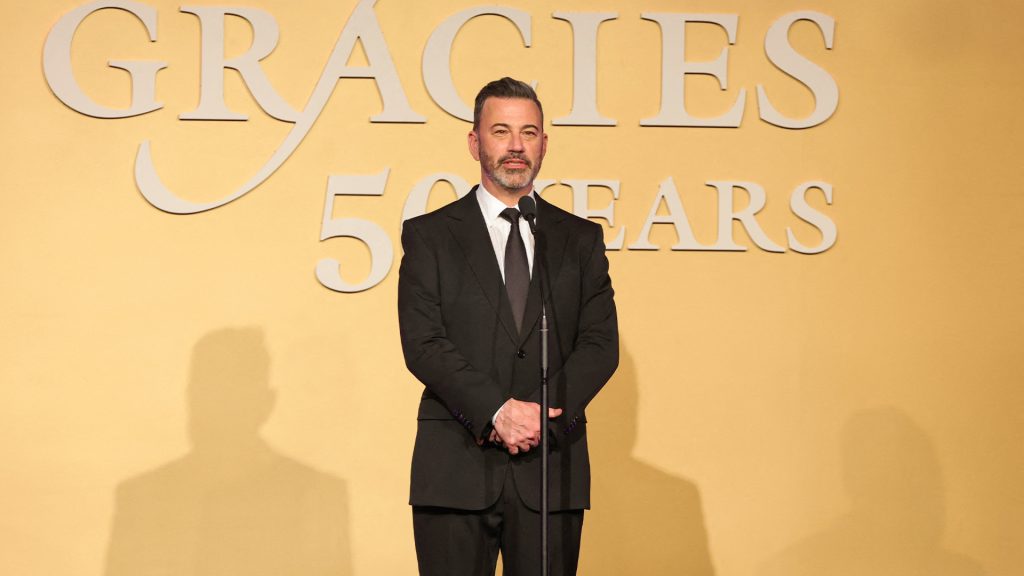
NewsFeed US talk show host Jimmy Kimmel was pulled off air indefinitely after he joked about the political reaction to the killing of right-wing activist Charlie Kirk. Here’s what the row is all about. Published On 18 Sep 202518 Sep 2025 Click here to share on social media share2 Share Adblock test (Why?)
Displaced Palestinians shelter at garbage dumps
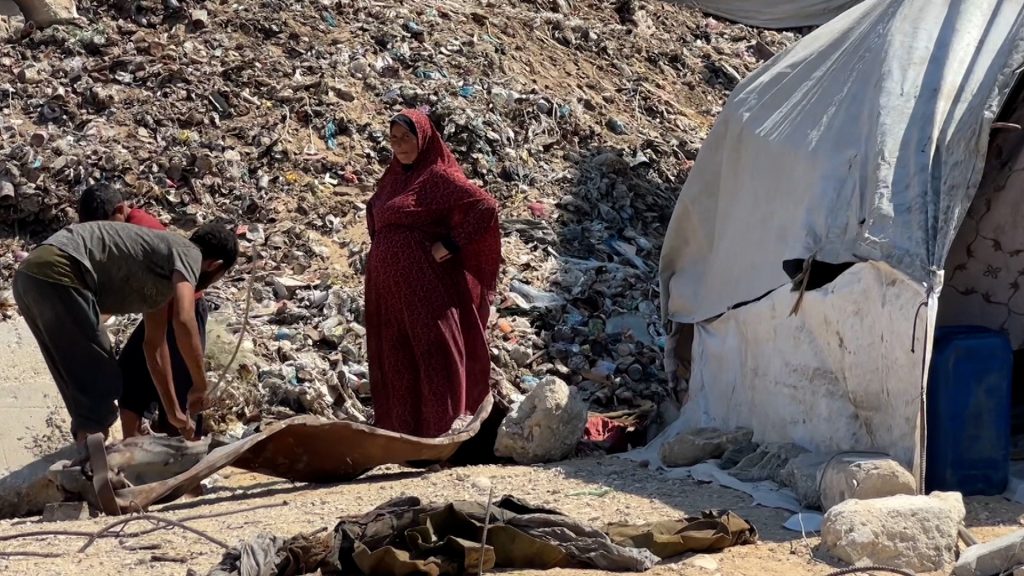
NewsFeed With nowhere else to go, Palestinians displaced from Gaza City are pitching tents on landfill sites where families say they are surrounded by garbage and disease. Published On 18 Sep 202518 Sep 2025 Click here to share on social media share2 Share Adblock test (Why?)
Fed rate cuts: Saving American jobs or stoking inflation?
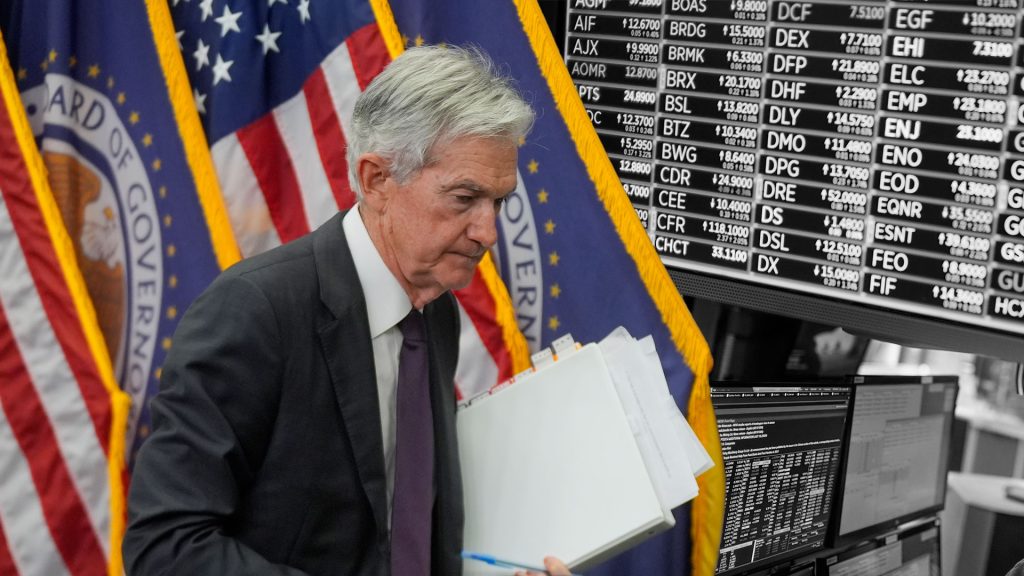
US Federal Reserve reduces interest rates and signals more cuts ahead as the labour market slows. The United States Federal Reserve is walking a tightrope. It wants to keep employment high and inflation low. But both are pointing in the wrong direction. For now, policymakers seem more worried about the health of the labour market than the risk of rising prices. For the first time since December, the central bank has lowered interest rates to help shore up the ailing job market. But that might also push prices up. Also – the Fed faces political pressure, with President Donald Trump accused of challenging its independence. Can European electric cars catch up with China? Plus, Senegal’s hidden debt crisis. Published On 18 Sep 202518 Sep 2025 Click here to share on social media share2 Share Adblock test (Why?)
Russia-Ukraine war: List of key events, day 1,302
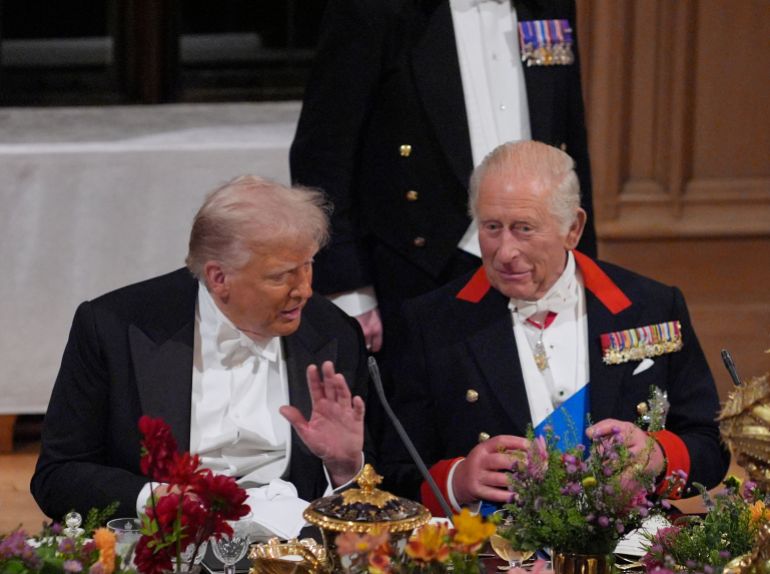
Here are the key events on day 1,302 of Russia’s war on Ukraine. Published On 18 Sep 202518 Sep 2025 Click here to share on social media share2 Share Here is how things stand on Thursday, September 18: Fighting A Ukrainian drone has struck a car in Russia’s Belgorod border region, killing one person and injuring another, according to the region’s governor. The Ukrainian army lost more than 1,500 troops during front-line fighting over the past day, reported Russia’s state TASS news agency, citing the Ministry of Defence. Ukraine has not confirmed the claim, and both sides have engaged in what independent analysts described as unsurprising narrative warfare aimed at projecting military gains. The General Staff of the Ukrainian armed forces said Russia had lost an estimated 1,020 people, along with 360 unmanned aerial vehicles and 36 artillery systems, in the past day. Russia has not confirmed the claim. Meanwhile, Russian forces also hit Ukrainian railway infrastructure facilities, “storage and launch sites for long-range unmanned aerial vehicles, as well as temporary deployment sites”, the Russian Defence Ministry said. Ukrainian President Volodymyr Zelenskyy wrote on social media platform X that although Russia had prepared offensives in Sumy, Novopavlivka, Pokrovsk and Zaporizhzhia this year, Russia has lost “so much manpower” that “as of now, they lack the strength for large-scale offensives.” Military Speaking at a joint news conference with European Parliament President Roberta Metsola, Zelenskyy said missiles for Western air defence systems were among the first set of US weapons being sent under the Priority Ukraine Requirements List (PURL) mechanism, which allows NATO states to pay for the transfer of United States-sourced weapons and technology. Ukraine has received more than $2bn so far as part of the PURL scheme, Zelenskyy said, with the total expected to rise to up to $3.6bn in October. Lithuanian prosecutors charged 15 people in connection with detonations of DHL parcels at logistics depots in Europe last year, which prosecutors allege were organised by Russian citizens with ties to Russian military intelligence. In what Danish Prime Minister Mette Frederiksen called “a paradigm shift”, Denmark will procure “long-range precision weapons” for the first time in response to the threat posed by Russia. Moscow’s ambassador to Copenhagen said the decision was “pure madness”. Advertisement Politics and diplomacy After a birthday phone call from Putin, Indian Prime Minister Narendra Modi thanked the Russian president – who he referred to as “my friend” – on X, writing that India is “ready to make all possible contributions towards a peaceful resolution of the Ukraine conflict”. King Charles seemed to gently nudge US President Donald Trump on standing firm in Ukraine’s corner, during a lavish ceremony for Trump during his visit to the United Kingdom, when the British monarch recalled the US-UK alliance during World Wars I and II. “Today, as tyranny once again threatens Europe, we and our allies stand together in support of Ukraine, to deter aggression and secure peace,” the king said. The comments came amid questions over whether Trump has put sufficient pressure on Putin to negotiate a peace deal. Ahead of the 80th United Nations General Assembly “high-level” week, UN Secretary-General Antonio Guterres said he would meet with Russian and Ukrainian delegations but was “not optimistic about the short-term progress in the peace process in Ukraine”. The two sides’ positions are too different, he said, with Ukraine driven by “a legitimate interest to preserve its territory” and Russia “determined to [do] something that would mean the occupation of large parts of Ukraine”. Russian nationalists and online bots moved quickly to sow division after the killing of conservative right-wing figure Charlie Kirk, The Associated Press news agency reported, tying his death to US support for Ukraine and even spreading the conspiracy theory that Ukraine was responsible for his death. US President Donald Trump and King Charles speak on day one of Trump’s second state visit to the UK [Yui Mok/Reuters] Economy and energy Ukraine and the US International Development Finance Corporation said they would each commit $75m to a joint investment fund that is part of Kyiv’s minerals deal with Washington. The deal – which Trump has referred to as “payback” for Ukraine aid – was signed in May and will give the US preferential access to new Ukrainian minerals and natural resources licences in exchange for post-war financial and military assistance. Ukraine has gas reserves to meet about 80 to 90 percent of its demand for the upcoming winter, but still needs up to $1bn in additional fuel stockpiled, data show. Russia’s consumer price index rose by 0.04 percent in the week ending September 15, the state statistics agency said, compared with 0.1 percent growth in the previous week. Overall price growth in the year to date stands at 4.08 percent, compared with 5.78 percent for the same period last year. Advertisement Adblock test (Why?)
ABC to indefinitely halt Jimmy Kimmel Live! after Charlie Kirk remarks
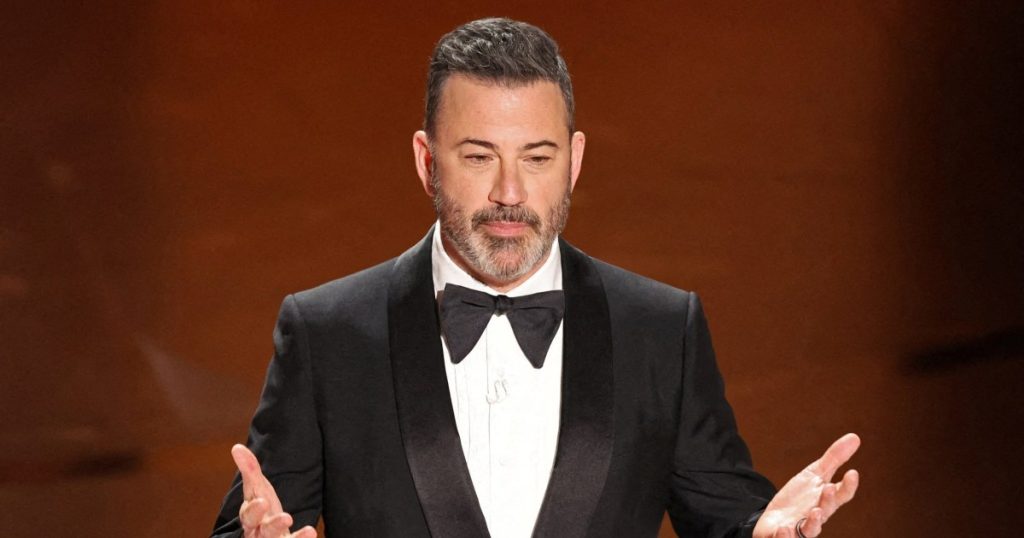
United States television network ABC has announced it will indefinitely cease airing Jimmy Kimmel Live due to comments made by the popular chat show’s host about the assassination of right-wing activist Charlie Kirk. Walt Disney-owned ABC said on Wednesday the show would be “preempted indefinitely” due to Kimmel’s comments suggesting the man charged with Kirk’s assassination in Utah last week, Tyler Robinson, is a supporter of US President Donald Trump. Recommended Stories list of 3 itemsend of list “We hit some new lows over the weekend with the MAGA gang desperately trying to characterise this kid who murdered Charlie Kirk as anything other than one of them, and doing everything they can to score political points from it,” Kimmel said on Monday in a monologue on his long-running late-night talk show. Earlier, Nexstar Media, one of the country’s largest local TV station owners, including at least 28 ABC affiliates, announced it would stop airing the show over Kimmel’s remarks about the Kirk killing. Announcing the move, Nexstar Media President Andrew Alford said Kimmel’s comments were “offensive and insensitive at a critical time in our national political discourse”. “We do not believe they reflect the spectrum of opinions, views, or values of the local communities in which we are located,” he said. While Utah prosecutors have formally charged Robinson with the murder of Charlie Kirk and said they will seek the death penalty, questions remain about a possible motive. Kimmel’s comments also drew condemnation on Wednesday from Brendan Carr, the chair of the Federal Communications Commission (FCC), the independent US government TV, radio and internet regulator. Advertisement In an interview with right-wing YouTuber Benny Johnson, Carr described Kimmel’s comments as “the sickest conduct possible”, and he also appeared to threaten ABC affiliate licences over the presenter’s remarks. “What people don’t understand is that the broadcasters … have a licence granted by us at the FCC, and that comes with it an obligation to operate in the public interest,” Carr said. Carr explicitly called on ABC affiliates to “push back” on the network’s airing of Jimmy Kimmel Live as they run the risk of “licence revocation” due to a “pattern of news distortion”. Al Jazeera’s Heidi Zhou-Castro said it was important to note that Kimmel is a household name in the US, where many people have watched his talk show for more than 20 years. “What he said on Monday was he suggested the suspected shooter of Charlie Kirk was a pro-Trump Republican,” Zhou-Castro said, adding that Kimmel made his remarks before authorities released text messages that appeared to confirm that the suspected killer was in fact opposed, politically, to Kirk. The fallout from Kimmel’s comment was rapid and grew until the Trump-appointed chair of the FCC, which regulates all broadcasts in the US, demanded that action be taken against the host. Kimmel is not alone in being sanctioned for comments in the aftermath of the Kirk killing. “There have been notable journalists as well as analysts and also just everyday people who have lost their jobs because of comments they made about Charlie Kirk’s death,” Zhou-Castro said. “In fact, the US Vice President JD Vance advocated for people to report on each other to their employers if anyone said something on social media, etcetera, that seemed to disparage Kirk,” she said. Following news of Kimmel’s cancellation on Nexstar, FCC Chairman Carr told The Hollywood Reporter news outlet he wanted to thank the firm “for doing the right thing”. At least one other station group had contacted ABC about the Kimmel show, suggesting that an affiliate revolt may have played a role in the decision, an unnamed source told The Hollywood Reporter. Kimmel’s cancellation is the latest in a spate of firings over the past week, brought on by a conservative backlash to public comments about Kirk’s killing that have been deemed insensitive. Conservatives have mourned Kirk as a martyr who championed patriotism, open debate and Christian values. Others have rebuked his divisive views, including on immigration and Islamophobia, with some also celebrating his death. Journalists, academics and doctors are among those who have been fired or investigated by their employers over comments made about Kirk, mirroring the much-maligned cancellation campaigns of recent years associated with America’s left and sparking debate over the limits of free speech in the US. Advertisement Adblock test (Why?)
‘A script’: Texts of alleged Charlie Kirk killer fuel conspiracy theories
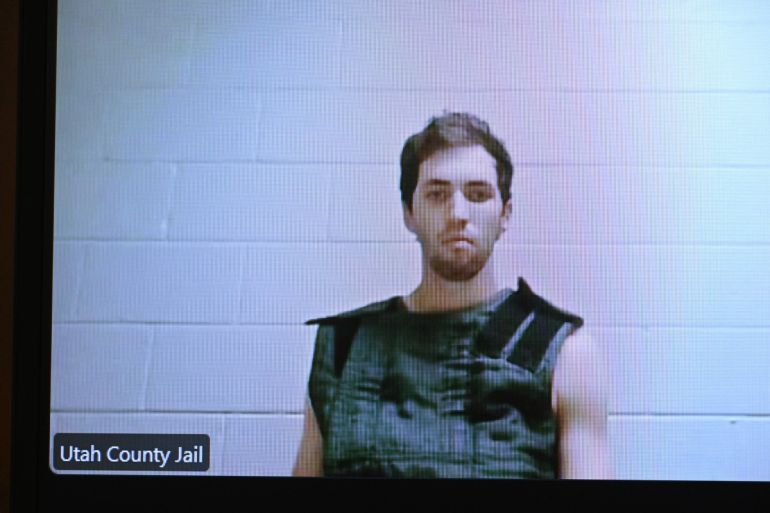
The deluge of conspiracy theories began almost the moment authorities revealed the text messages allegedly sent by the suspected assassin of right-wing American activist Charlie Kirk. After prosecutors in the US state of Utah published alleged text exchanges between 22-year-old Tyler Robinson and his romantic partner on Tuesday, countless social media users, including numerous prominent influencers, cast doubt on their authenticity. Recommended Stories list of 4 itemsend of list Some outright claimed that the texts, in which Robinson appears to confess to killing Kirk, had been fabricated by authorities. Many of the posts suggested that the language and tone of the exchanges did not match someone of Robinson’s age, and the account of the shooting was too forthcoming and detailed to be believable. Notably, at a time of extreme political polarisation in the US, the conspiracy theorising united figures on the left and right. A screen shows Tyler Robinson, the suspect in the killing of political activist Charlie Kirk, as he attends a court appearance remotely before the 4th District Court in Provo, Utah, on September 16, 2025 [Pool via AFP] Matt Walsh, a right-wing commentator and podcast host with millions of followers on X and YouTube, suggested the exchanges had been scripted to absolve Robinson’s transgender partner of any involvement in the shooting. “This feels like a strategy they cooked up from watching too much TV,” Walsh said on X. Utah Governor Spencer Cox has said that the partner, described as a “male transitioning to female”, had no advance knowledge of the crime and has been cooperating fully with authorities. Advertisement Steven Bannon, US President Donald Trump’s former adviser, said on his podcast that he was “not buying” the texts, describing them as “too stilted, too much like a script”. On the other side of the political spectrum, Majid Padellan, a progressive influencer who goes by Brooklyn Dad Defiant on social media, said he did not believe for “one second” that the texts had been written by Robinson. “I didn’t know him personally, but I know that no 22 year old writes text messages like this,” Padellan said on X. “This feels like that Steve Buscemi skateboard meme ‘How do you do, fellow kids?”’ Liberal commentator Joanne Carducci, who posts under the moniker JoJoFromJerz, noted that the official narrative around the assassination had prompted rare agreement across the ideological divide. “No one is buying these text messages. No one on the left or the right,” Carducci said on X. “We cannot agree on a damn thing anymore. But we agree on this. If that doesn’t speak volumes, nothing does.” The Utah County Attorney did not respond to a request for comment about the claims online. Utah County Attorney Jeffrey S. Gray speaks during a press conference about the charges against Tyler Robinson in Provo, Utah, on September 16, 2025 [Jim Urquhart/Reuters] Speculation and conspiracy theories have become a routine feature of the reaction to high-profile acts of violence in the US in the polarised and trigger-happy landscape of social media and online forums. After a gunman shot dead a Minnesota state lawmaker and her husband in June, right-wing conspiracy theorists claimed that the shooting had been perpetrated by a left-wing extremist or carried out on behalf of the state’s Democratic governor, Tim Walz. The alleged gunman, Vance Boelter, espoused staunchly conservative views on issues including abortion and LGBTQ rights. The 2022 mass shooting in Uvalde, Texas; the 2018 high school shooting in Parkland, Florida; and the 2017 Las Vegas shooting all spawned right-wing conspiracy theories, including the claim that the attacks had been staged to give the US government a pretext to curtail gun rights. While many conspiracy theories have been driven by a particular ideological faction, Kirk’s assassination is the latest event to fuel unfounded claims with “cross-ideological appeal”, said Eric Oliver, a professor of political science at the University of Chicago who studies conspiracy theories. Claims about Robinson fit the mould of theories about the late financier and sex offender Jeffrey Epstein and the pharmaceutical industry, which also cut across partisan and ideological lines, Oliver said. Advertisement “People are also really emotionally charged by this, both on the left and the right, and will often gravitate to stories that rationalise their fear, rage, or feelings of powerlessness,” Oliver told Al Jazeera. The “extraordinary circumstances” of Kirk’s murder, including a relative lack of information about Robinson, had also left a vacuum that was being filled by people “already suspicious of anything either the government does or this administration does”, Oliver added. The transcripts of Robinson’s alleged texts released by prosecutors provided some of the clearest indications yet of a possible motive for assassinating Kirk, who was lauded by conservatives but seen as an inflammatory figure on the left for his right-wing stances on immigration, abortion and transgender rights, among other issues. Robinson allegedly told his partner that he had “had enough” of Kirk’s “hatred” and “some hate can’t be negotiated out”. Authorities previously announced that they recovered bullet casings inscribed with a number of politically-charged and internet subculture-influenced messages, including “Hey fascist! Catch!” Prosecutors, who allege Kirk was targeted over his “political expression”, have charged Robinson with aggravated murder and six other charges. That the released details of Robinson’s alleged communication with his partner after Kirk’s assassination have only further fuelled conspiracies is not surprising, suggest experts. “Many people have a worldview in which conspiracies are going on all the time and explain our social and political circumstances – those people believe lots and lots of conspiracy theories and exist on both the right and left,” said Joseph Uscinski, a professor of political science at the University of Miami, whose research focuses on conspiracy theories. And though conspiracy theorising has become rampant on social media, the platforms themselves are not the problem, Uscinski said. “People have worldviews; some of those worldviews make conspiracy theories easy to believe, whether those people are on social media or not,” he told Al Jazeera. “Conspiracy theories existed long before social media and may
Why Ben & Jerry’s co-founder quit over Gaza

NewsFeed Jerry Greenfield, co-founder of Ben & Jerry’s, has resigned after nearly fifty years, accusing parent company Unilever of silencing its stance on Israel’s war on Gaza. The decision follows years of tension, including a 2021 move to halt sales in the occupied West Bank. Published On 17 Sep 202517 Sep 2025 Click here to share on social media share2 Share Adblock test (Why?)

